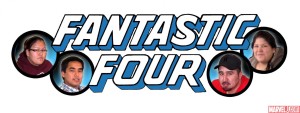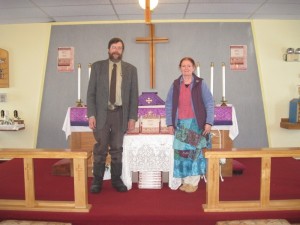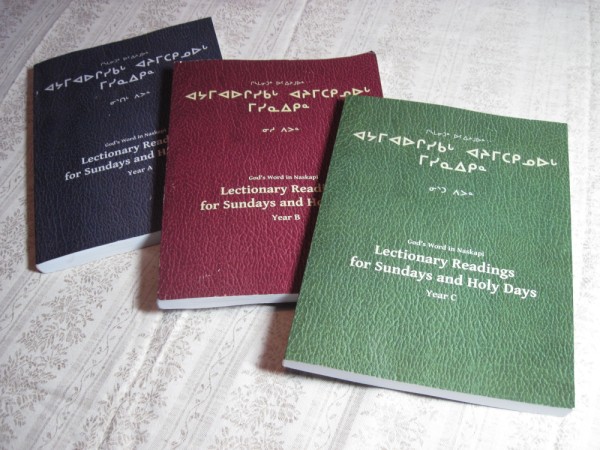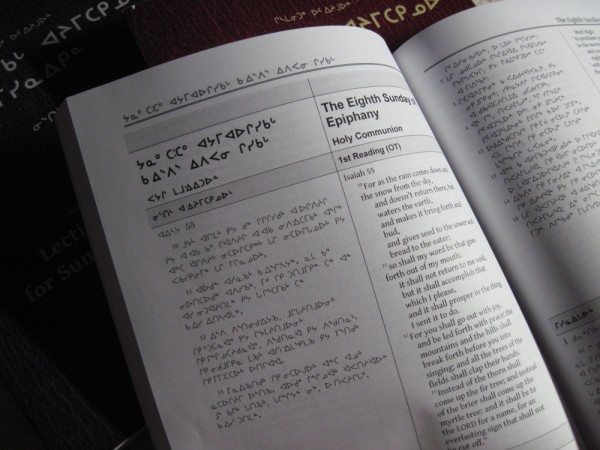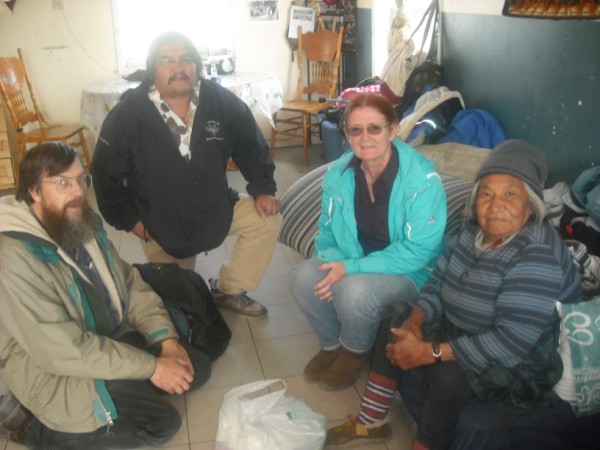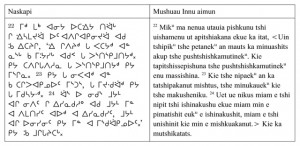Page 2…(continued from previous post)
Naskapi Language Project
Three of the four new Naskapi language specialists have continued to work on language projects (Jimmy was unable to continue). Amanda is focusing on the translation of the book of Joshua, Kissandra on the book of First Samuel, and Kabimbetas on the book of First Kings. Silas will continue work on the Psalms and in reviewing the work of the new language specialists. 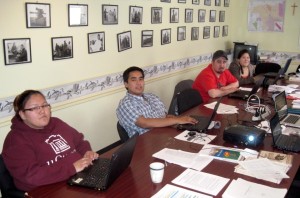 We also have several projects underway by Naskapi language “interns”, that is, those who desire to work on Naskapi language projects but because of other commitments are unable to work on them full-time: Tshiueten continues his work on the book of Exodus; he completed the first draft up through most of chapter 25, Louise has completed most of the book of Esther, and Cheyenne has begun work on Second Samuel.
We also have several projects underway by Naskapi language “interns”, that is, those who desire to work on Naskapi language projects but because of other commitments are unable to work on them full-time: Tshiueten continues his work on the book of Exodus; he completed the first draft up through most of chapter 25, Louise has completed most of the book of Esther, and Cheyenne has begun work on Second Samuel.
Since the publication of the Naskapi New Testament in 2007, there has been growing interest among Naskapi speakers both to learn 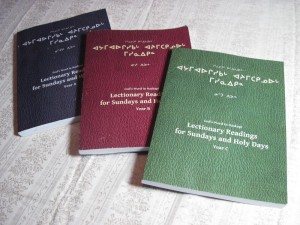 to read God’s Word in their own language, and to have more scripture to read. For this reason, over the past four years, we have worked on the Naskapi Lectionary series, all the Sunday readings for the Old Testament lessons and the Psalms along with the Gospels and Epistles. This three-volume set contains more than 900 verses of the Old Testament lessons and nearly 800 verses from the Psalms, organized with the Epistle and Gospel readings for every Sunday and holy days of the year. Many Naskapis now have their own copies of the Lectionar
to read God’s Word in their own language, and to have more scripture to read. For this reason, over the past four years, we have worked on the Naskapi Lectionary series, all the Sunday readings for the Old Testament lessons and the Psalms along with the Gospels and Epistles. This three-volume set contains more than 900 verses of the Old Testament lessons and nearly 800 verses from the Psalms, organized with the Epistle and Gospel readings for every Sunday and holy days of the year. Many Naskapis now have their own copies of the Lectionar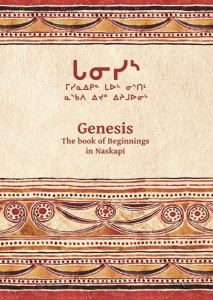 y readings that they bring with them to church each week.
y readings that they bring with them to church each week.
In February, we also dedicated the book of Genesis in Naskapi, a 150-page illustrated volume with all 50 chapters of Genesis in Naskapi.
Besides the ongoing Old Testament translation work, 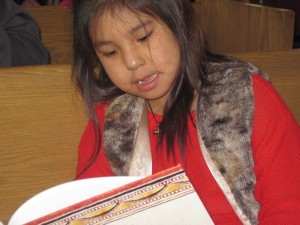 Bill continues to facilitate the work on the Naskapi Lexicon, Naskapi children’s books and Naskapi stories and legends. The first edition of the Naskapi stories and legends series was published this summer, in a book in Naskapi with a literary English translation that was beautifully illustrated by our daughter Elizabeth, entitled “Kuihkwahchaw: Naskapi Wolverine Stories”. (now available on-line http://www.lulu.com/spotlight/naskapi)
Bill continues to facilitate the work on the Naskapi Lexicon, Naskapi children’s books and Naskapi stories and legends. The first edition of the Naskapi stories and legends series was published this summer, in a book in Naskapi with a literary English translation that was beautifully illustrated by our daughter Elizabeth, entitled “Kuihkwahchaw: Naskapi Wolverine Stories”. (now available on-line http://www.lulu.com/spotlight/naskapi)
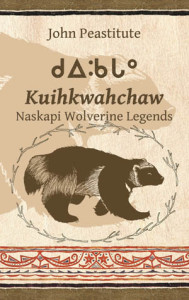 Mentoring and Consulting
Mentoring and Consulting
As an ongoing part of becoming better equipped to serve the Naskapi, Innu, and other minority language development projects, Bill is continuing his development as a linguistics consultant-in-training, while Norma Jean is working on her education consultant training in the MA-TESOL classroom at Trinity Western University. Together they are being directed through guided reading in the elements of mentoring, teaching and learning cross-culturally, and peer-to-peer consulting. They will be taking on more of a mentoring role serving along side mother-tongue speakers and younger workers.
Living on the “west coast”
Since Norma Jean is following her MA program in British Columbia, we have located near there to be close to Trinity Western University. 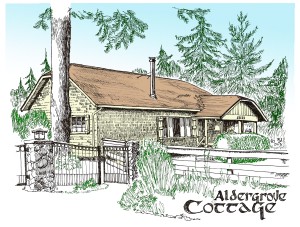 We rented out our house in Schefferville, which helps provide funds for us to rent a small cottage in Aldergrove, BC. We have been working on all the details of moving into a new place on the west coast, including finding a church, getting a phone and utilities, and having our license, insurance and registration transferred here. We have been furnishing the house mostly with free, donated, and thrift-store furniture and supplies, and are very grateful for these kinds of services.
We rented out our house in Schefferville, which helps provide funds for us to rent a small cottage in Aldergrove, BC. We have been working on all the details of moving into a new place on the west coast, including finding a church, getting a phone and utilities, and having our license, insurance and registration transferred here. We have been furnishing the house mostly with free, donated, and thrift-store furniture and supplies, and are very grateful for these kinds of services.
Family Matters
Our son Nicodemus John is pursuing studies in social work, has been accepted as a third year student into the undergraduate program at Trinity Western University, and plans to live on-campus in the dorm there. He arrived in the area on August 28.
Elizabeth and Eric have been serving in a church in Korea, where they have been teaching English as a second language and helping with the summer Vacation Bible School program there. They will be returning home to Connecticut later in September after a short visit with us in British Columbia.
Ben and Tamika took Nya and Arion on a cross-Canada trip this summer and it was a joy to cross paths with them in British Columbia as well, before they headed south to California and a trip back east across the USA.
Thank you for your prayers for our ongoing work and school, as we continue to serve and look with anticipation on the way God will use us in the future.
Serving with you,
Bill and Norma Jean Jancewicz
25133 0 Ave
Aldergrove, BC V4W 2H4 CANADA
home phone: 604-381-4440 (no cell phone)
e-mail:
bill_jancewicz@sil.org
normajean_jancewicz@sil.org
website:
billjancewicz.zerflin.com
Financial support:
Wycliffe Bible Translators
PO Box 628200
Orlando, FL 32862-8200 USA
www.wycliffe.org
Wycliffe Canada
4316 10 St NE
Calgary, AB T2E 6K3
www.wycliffe.ca
Northern Translation Summer 2013 Newsletter
Our dear partners,
Thank you for your prayers for us during the past few hectic months of work on Naskapi language projects and our service to others as part of our Wycliffe assignment. During the first four months of 2013, we were working mainly in northeast Canada at our home in Schefferville near the Naskapi community of Kawawachikamach (Kawawa). Norma Jean has served the past few years in the Naskapi school in the Naskapi language curriculum department, in support of teachers who teach in the Naskapi language in elementary school. The curriculum department is responsible for providing the Naskapi language materials that are used to help Naskapi children learn to read and write their own language.
Over in Labrador on the coast about 240 miles east of Kawawa is the Mushuau Innu community of Natuashish, close relatives of the Naskapi. We were invited to conduct training workshops there and at the other Labrador Innu community of Sheshatshiu for Innu-speaking classroom assistants, and to help them to begin setting up their own curriculum department at their schools there in March. Norma Jean conducted education and material production classes, while Bill provided computer training and also began to explore adapting the Naskapi scriptures to the Mushuau Innu language by audio.
Naskapi Language Specialists
The first few months of the year had Bill also very busy with a remarkable opportunity to recruit and train four new Naskapi language specialists to work full-time in the Naskapi community on translation and other language development work. 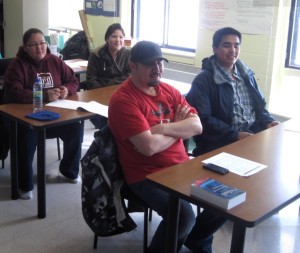 The four that were selected and hired by the Naskapi Development Corporation were Amanda, Kissandra, Kabimbetas and Jimmy. These four were trained in using computers to do Naskapi translation work, and in daily reading and writing practice, with a view to working more and more independently on translation projects of their own. Also, in April Bill taught another section of the McGill University teacher-training class, a dozen Naskapi adults who are working towards their Bachelors of Education (B.Ed) in order to teach and/or prepare Naskapi materials at the Naskapi school. This four-year program started in 2010 includes undergraduate-level university courses provided for the most part right in the community. Bill has been teaching adult literacy principles (reading and writing in Naskapi) along with Naskapi grammar to enhance their reading success. The four Naskapi language specialists-in-training also joined the McGill students since what they needed to learn was pretty much the same thing that Bill was teaching there.
The four that were selected and hired by the Naskapi Development Corporation were Amanda, Kissandra, Kabimbetas and Jimmy. These four were trained in using computers to do Naskapi translation work, and in daily reading and writing practice, with a view to working more and more independently on translation projects of their own. Also, in April Bill taught another section of the McGill University teacher-training class, a dozen Naskapi adults who are working towards their Bachelors of Education (B.Ed) in order to teach and/or prepare Naskapi materials at the Naskapi school. This four-year program started in 2010 includes undergraduate-level university courses provided for the most part right in the community. Bill has been teaching adult literacy principles (reading and writing in Naskapi) along with Naskapi grammar to enhance their reading success. The four Naskapi language specialists-in-training also joined the McGill students since what they needed to learn was pretty much the same thing that Bill was teaching there.
Professional Development and Academics
Since beginning to work with Wycliffe we have always been strongly encouraged to keep our education and linguistics skills current, but that was not always easy to do, with the full-time work on the language project and raising a family. But since the publication of the Naskapi New Testament in 2007, our Wycliffe administration has urged us to follow through by working towards advanced degrees in our fields of service. So, back in 2009, we enrolled in studies at the Summer Institute of Linguistics (SIL) at the University of North Dakota (UND).

English: Merrifield Hall on the campus of the University of North Dakota in Grand Forks, North Dakota, USA. (Photo credit: Wikipedia)
Bill began his studies towards a Master of Arts (MA) in linguistics, and Norma Jean took the “Mega-Literacy” courses there that summer. This was also the summer that we moved back to the Naskapi community to focus on Naskapi literacy training and Old Testament translation. For the next five summers, we would return to the University of North Dakota SIL where Bill continued his graduate-level course-work in linguistics. We decided that it would be best for everyone if only one of us were enrolled in graduate school at a time, so Norma Jean served as director for childcare services at SIL for the past four summers, rather than course-work. Bill completed his MA course-work and successfully defended his thesis this summer in North Dakota, and graduated with his MA in linguistics from UND on August 2. The title of his thesis is “Grammar Enhanced Biliteracy: Naskapi Language Structures for Facilitating Reading in Naskapi”, which researches how teaching Naskapi grammar might assist those who are learning to read in Naskapi.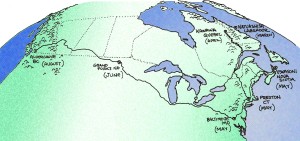
As already mentioned above, Norma Jean’s expertise and service to the language communities focuses on the area of education and curriculum, and, like Bill, wants her academic studies to contribute to her service in a significant way. She found course-work that focuses on multi-lingual education theory and practice in the MA-TESOL program that is offered by Trinity Western University, in Langley, British Columbia. She applied for and was accepted into this program, which is a 12-month, full-time course beginning in September of 2013. Besides the course-work, she will also be doing practical projects and internships, which may include periods of service in the Naskapi or Innu communities to apply the principles she will be learning.
While TESOL generally refers to “Teaching English to Speakers of Other Languages”, Norma Jean’s focus will actually include methods of teaching literacy skills in the mother-tongue; such as teaching Naskapi speakers to read and write Naskapi better, or teaching Innu speakers to read and write Innu better, which will also result in their overall success in their language skills in other languages. The educational principles and strategies for these goals are similar, and can be applied to our ongoing language development work in these and other minority-languages.
…to be continued tomorrow (on page 2)

Northern Translation Brief 20April2013
God is doing lots of good things here in Kawawa this spring, I just want to highlight a couple of them. Back in February, I received some remarkable news from the directors of the Naskapi Development Corporation (NDC), where I have been working with Silas over the past two decades plugging away at Naskapi Bible translation, and other Naskapi language development projects (New Testament, Naskapi children’s books, church lectionary readings, Naskapi dictionary… such things).
The directors decided that to better serve the community, they should increase the translation staff–they decided to quadruple it!–and so, I was invited to recruit and hire persons for two to four new “Naskapi Language Specialists-in-training” positions to continue the Naskapi translation work beyond the projects we already have underway. So, in February, we posted the positions, that carry a modest (for Kawawa) salary, but include the possibility of becoming a life-changing career for the recruits with “the right stuff”. On the last week of the posting, I interviewed four bright young Naskapi people: two women and two men, all of them between the ages of 25 and 30.
After testing their baseline skills in Naskapi, I prayerfully decided to hire and train all four of them, and began to work with them at the office on March 1.
Since then, Amanda Swappie, Kabimbetas Noah Mokoush, Jimmy D. Shecanapish and Kissandra Sandy-Dominique have made tremendous progress surviving my instruction and applying themselves with daily practice, as they are learning to read Naskapi fluently, type and transcribe Naskapi syllabics into the computer, learn the various computer-based translation tools that help us today in language work (parallel Bible tools, dictionary and digital audio tools, commentaries and grammars), and study the structure of the Naskapi language.
The NDC office has been regenerated with the youthful enthusiasm of these new recruits, and we have started to refer to them as the “Fantastic Four“. They are learning to work both as a team and independently, and have improved on many levels during their current probationary period of employment.
 For the first three weeks of April, I was once again given the wonderful opportunity to serve as the guest instructor for the Naskapi-McGill teacher training program, teaching another section of the Naskapi Language Foundations course (Naskapi IV) to the cohort of about a dozen undergrad Naskapi students enrolled in the McGill University program. I was able to bring the “Fantastic Four” with me into the classroom to audit the grammar and literacy training that is being provided to this bright group of students.
For the first three weeks of April, I was once again given the wonderful opportunity to serve as the guest instructor for the Naskapi-McGill teacher training program, teaching another section of the Naskapi Language Foundations course (Naskapi IV) to the cohort of about a dozen undergrad Naskapi students enrolled in the McGill University program. I was able to bring the “Fantastic Four” with me into the classroom to audit the grammar and literacy training that is being provided to this bright group of students.
And now, this week each of the “Four” will be starting on the adventure of translating a portion of the Old Testament into Naskapi–they are each beginning on a different “historical” book (Joshua, 1 & 2 Samuel, and Kings), which, Lord willing, they will all be working through for the long-term, as they continue to learn the skills and art of crafting a translation of the Bible into their own mother tongue.
All this while at the same time I am in “thesis mode” as work through the write-up of my own MA in linguistics final project. Our plans are to leave Schefferville at the end of this week as we begin to make our way over to SIL at the University of North Dakota where I am scheduled to defend my thesis this summer. If a candle had more than two ends I guess I would be burning those as well.
But I am so deeply grateful for the privilege of working with our new “Naskapi Language specialists-in-training” (the Fantastic Four) as well as the Naskapi-McGill teacher-training class. Seeing God at work in the lives of so many people here in the Naskapi community is exciting and humbling at the same time.
We know that you will want to remember to pray for each of them by name, but even if you can’t remember their names, just bring the Fantastic Four working on the Naskapi Old Testament to the Lord, and He’ll know who you are asking about. Remember us too, as we have many thousands of miles to travel in the next month or so (and all the loose ends to take care of, and a thesis to write…)
Serving with you, Bill and Norma Jean

Northern Translation Brief 10Mar2013
Our dear partners,
Very briefly! Norma Jean and I are on our way again this week to visit Natuashish, the Mushuau Innu community on the Labrador coast. Norma Jean has been asked to conduct another Innu curriculum workshop for the Innu-speaking classroom assistants, and I am along for computer support.
We are also hoping to do some sessions with Mushuau Innu speakers listening to Naskapi audio scripture portions and seeing if they can re-tell the stories in their own dialect in order to build a Mushuau Innu audio version of the Bible.
We will also be serving the Innu school classroom assistants in Sheshatshiu near Goose Bay the following week, before returning to our Naskapi work in Schefferville on 22 March. Thanks for your prayers for us and for God’s hand at work among the Innu and the Naskapi.
Serving with you, Bill and Norma Jean
Northern Translation Brief: Naskapi Genesis Dedication
On Sunday, 17 February 2013, the Naskapi community celebrated during the dedication of the translation of the book of Genesis in Naskapi. This dedication was held during the Sunday morning services at St. John’s Anglican Church. Rev. Martha Spence led the congregation in thanks to God for the many years of work by the Naskapi Development Corporation (NDC) translation team that brought this portion of God’s Word into the hands of the Naskapi community in their own language.
 Silas Nabinicaboo, who was recently ordained a deacon at the Naskapi church, has served as the lead translator on this project since it was started in 1996. At that time, his salary was completely funded by donations from interested individuals and churches who partner with us for Bible translation. After a the first few years, however, Silas was invited by the NDC board of directors to continue work as a full-time employee as they realized the importance of Naskapi Bible translation as one of the core activities related to Naskapi language development.
Silas Nabinicaboo, who was recently ordained a deacon at the Naskapi church, has served as the lead translator on this project since it was started in 1996. At that time, his salary was completely funded by donations from interested individuals and churches who partner with us for Bible translation. After a the first few years, however, Silas was invited by the NDC board of directors to continue work as a full-time employee as they realized the importance of Naskapi Bible translation as one of the core activities related to Naskapi language development.
The cover design of the books was inspired by the hand-painted caribou-skin ceremonial coats that were made and worn long ago by ancestors of the Naskapi. The Genesis books were printed in two sizes: standard 6″ x 9″ size for general reading and use in church, and “large print” 8″ x 10″ size for distribution to elders, use on the pulpit, and anywhere where large print text would make reading easier. Both sizes are available in library-quality hardcover or paperback. The NDC presented a gift copy of a large print edition to each Naskapi elder household. The remaining books are available for sale to the gen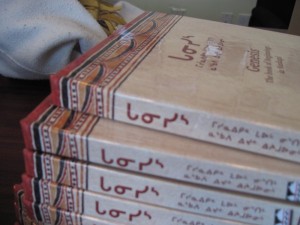 eral public at the NDC office at Kawawachikamach; $20 buys a hardcover book in either large print or regular size. Paperback versions are $10.
eral public at the NDC office at Kawawachikamach; $20 buys a hardcover book in either large print or regular size. Paperback versions are $10.
Outside Kawawa people can order their copies online here:
Regular size hardcover, large print hardcover, regular size paperback, large print paperback.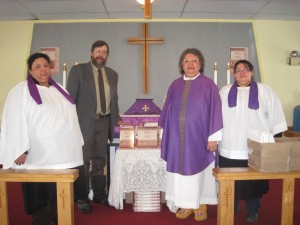
During the service, the books were displayed on the platform at the front of the church and all those assisting in conducting the service gathered around the books to pray God’s blessing on all who would read His word from them in the years to come. After the prayers, gift editions were given to all the elders who could be present at the service.
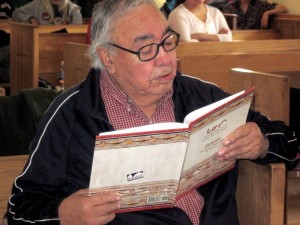 Following the service, a community feast was held in the church basement. We are grateful for God’s faithfulness and the prayers and generous support of all our partners that has made this milestone possible.
Following the service, a community feast was held in the church basement. We are grateful for God’s faithfulness and the prayers and generous support of all our partners that has made this milestone possible.
 You can read a related article on the Naskapi News website here.
You can read a related article on the Naskapi News website here.

New Year’s News
Our Dear Partners,
Through the second half of 2012 we have found ourselves very busy on several fronts as we serve to provide better access to the light of God’s Word in people’s heart language.
Naskapi
Since the Naskapi New Testament was dedicated and published in 2007, interest in reading this book and other books in Naskapi has grown significantly. Bill has been involved in developing a course and teaching Naskapi adults to read Naskapi, with a curriculum that includes a focus on Naskapi grammar and lots of group and individual reading–mainly reading from the Gospels. In October this course was taught over three weeks as the “Naskapi Language Foundations” course.
The Lectionary contains 7436 scripture verses read in church (during three years of Sundays)
3247 New Testament verses, 4190 Old Testament verses
This fall we helped the Naskapi translation team complete the final volume of the 3-year Sunday Lectionary. These books contain all the Sunday-morning Scripture readings from the Old Testament, the Psalms, the Epistles and the Gospels. Each Sunday, churches all around the world follow this reading plan that connects the topic of these readings to the events of the Christian year.
The first book of the Bible in Naskapi, Genesis, also underwent a thorough checking and revision, and we finished the typesetting, layout and proofreading in December. This means that early in 2013 there will be a dedication service at Kawawachikamach for the publication of Genesis in Naskapi.
Other Old Testament translation projects are ongoing, and include several new “intern” Naskapi Bible translators: Tshiuetin continues to work on Exodus, while Louise has nearly completed work on Esther; Edward, Cheyenne and others will be working on First Samuel, Job and Daniel in the coming months, time permitting.
Norma Jean has been working part-time in the Naskapi school curriculum office over the past few years: while Bill’s work remained focused on translation, grammar and adult literacy, Norma Jean’s work centers on preparing Naskapi materials for school children who are learning to read and write in their mother tongue.
Mushuau Innu
Norma Jean’s education experience and expertise in mother tongue reading and writing has earned her invitations to assist the Labrador Innu school board with workshops for the Innu-speaking classroom assistants who work in the schools in the communities of Sheshatshiu and Natuashish in Labrador in September and November of last year. Some of the Naskapi books and materials we have produced in Quebec are being adapted for use in these Labrador native communities.
While the people in Natuashish speak a language variety very close to Naskapi, they cannot read the Naskapi Bible because it is written using a much different writing system than the one that they use. However, during our September visit there it was shown that Mushuau Innu people understand spoken Naskapi quite well. We are encouraged that we are able to play audio versions of the Scriptures while the Mushuau Innu people re-tell the stories in their own words.
In August and September, we hosted a Wycliffe Intern, Andrew Laengert, who spent four weeks with us learning what a language project was like and helping where he could. You can read about his experiences here:
http://www.wycliffe.ca/
We hope that his experiences with us will help him to see how God may use his willing hands and heart in future ministry.
Academics
During the summer at SIL at the University of North Dakota, Bill finished his required course work for his graduate program towards an MA in Linguistics. Some paperwork, independent study and a thesis on the topic of the part that grammar can play in Naskapi literacy with keep him very busy in the months to come before we head back to North Dakota for the next summer session. During the fall Bill presented an acoustic phonetics paper on some aspects of the Naskapi and Mushuau Innu sound system at the Algonquian Conference held at the University of Chicago.
Norma Jean is currently exploring opportunities to enroll in graduate school to pursue studies in mother-tongue and multi-lingual education, building on her experience and work with Naskapi and Innu. Lord permitting, we hope that she can begin her program in the fall semester of this year, once Bill’s program is completed.
Capacity-Building
Now, more than ever, Naskapi and Innu people are being trained to successfully carry on much of the work that remains to be done. In the current paradigm we are increasingly serving as facilitators who see potential and confidence in younger speakers of these languages, who are learning to do the language development tasks themselves. In this way we can multiply our efforts and ensure the sustainability of these language projects.
We enjoyed spending our holidays with all of our children and grandchildren during a visit to Connecticut, and it was a special treat to connect with some of you along the way. Our car has 23,000 more miles on it this year than it did at this time last year–and this number does not include the air and railroad miles we traveled between native communities and other places of service. We are grateful for your prayers for safe travels and for your ongoing support and interest in our work.
Serving with you,
Bill and Norma Jean Jancewicz

Final volume of the Naskapi 3-year Lectionary published
Advent 2012 begins “Year-C” of the Revised Common Lectionary, the collection of Sunday Bible readings that are used in the Naskapi church. You may remember that the “Year-A” book came out almost two years ago now (the blue book) and the church has been using the “Year-B” book (the red book) for the past fifty-one weeks. Over the past several months we have reviewed and revised the remaining Old Testament verses that are contained in the “Year-C” book, and we have just printed sixty copies for distribution. On November 23 another prayer was answered: All the boxes of Year-C books arrived in Kawawachikamach in time for the first Sunday of Advent, which is December 2 this year!
Each Sunday morning, a selection from the Old Testament is read (generally somewhere between 8 and 30 verses), followed by a Psalm; then the New Testament readings: a selection from the Epistles and a passage from the Gospels. The three-year lectionary cycle is used by many denominations of the church, in which Scripture readings are arranged according to a schedule that follows the calendar of the year. This practice of assigning particular readings to each Sunday and Holy day has continued through the history of the Christian church. During the course of three years, more than seven thousand verses are read aloud to the congregation, a total that represents almost one-quarter of the Bible.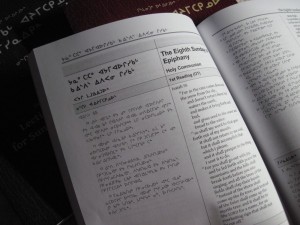
Like the other volumes of the lectionary, these books are being published and distributed by the Naskapi Development Corporation. People can drop by the office in Kawawachikamach anytime to purchase their own copy for just $10. The books are printed in diglot; that is, with the Naskapi text along side the English on each page. Readers simply look up the current Sunday in the index and turn to the appropriate page.
 Anyone outside of Kawawachikamach can order this book (and many other fine Naskapi books) from the Naskapi Resources page of the Lulu website, at this address: www.lulu.com/spotlight/naskapi. The Year C volume is a perfect companion to Year A and Year B.
Anyone outside of Kawawachikamach can order this book (and many other fine Naskapi books) from the Naskapi Resources page of the Lulu website, at this address: www.lulu.com/spotlight/naskapi. The Year C volume is a perfect companion to Year A and Year B.
Even though the Year C volume completes the series, the Naskapi Development Corporation translation and language services department continues to actively review and revise these readings each week as they are read at church, and plans to publish updated versions during the coming three-year cycle. The latest volume would make a perfect Christmas gift for any of your Naskapi family or friends.
There are several more Naskapi publication projects nearing completion in the coming months. We are currently working on the final check of a proof of the entire book of Genesis in Naskapi that should be completed in the coming weeks Lord willing, followed by the 2013 Naskapi Scripture calendar, a new Naskapi children’s book, the first book of Naskapi legends featuring Kuîhkwâhchâw (Wolverine), and the final book in the Walking With Jesus series of Bible stories on the life of Christ.
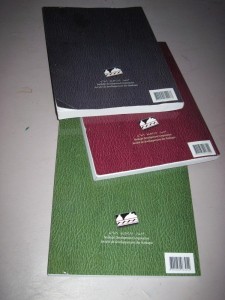 We want to thank you for your interest and support for all of these Naskapi language projects.
We want to thank you for your interest and support for all of these Naskapi language projects.
Serving with you, Bill and Norma Jean
Off to Labrador
Our Dear Partners,
Naskapi Elections 2012
Our dear partners,
Those of you in the US are following the Democrats and Republicans, and those of you in Quebec are watching the PQ, CAQ and Liberals in their provincial debates, but here at Kawawachikamach there is an election that is much closer to home for us.
The 3-year term for the Chief and Council is up for the Naskapi Nation, and the elections for Chief and Council is today. All day, from 10:00 AM to 8:00 PM people will be coming to the community center to vote on paper ballots: The current chief, Louis Einish, is running for another term, and he has two opponents, Isaac Pien and Michael Sandy. And among the 5 open positions for council, there are 15 candidates running.
I will assist in the vote-counting this evening between 8:00 and midnight. Pray for wisdom, peace and calm, (and stamina!) along with God’s guidance for the right choice of leadership in the Naskapi community and nation.
Serving with you, Bill and Norma Jean
PS, back in Kawawa we are working on finishing up the read-through of the proof copy of the book of Genesis, along with several other Naskapi literacy, literature and education projects.
A History of the Naskapis of Schefferville
This post is to announce the release of a new transcription of A History of the Naskapis of Schefferville, by the late Alan Cooke. In 1975 the Naskapi negotiators for the Northeastern Quebec Agreement (NEQA) asked Alan Cooke to “…write this history as a partial means of clearing up certain misunderstandings and misapprehensions  that have recurred at negotiating tables while discussing the Naskapis’ relation to the James Bay Agreement…”
that have recurred at negotiating tables while discussing the Naskapis’ relation to the James Bay Agreement…”
While the History has been useful to the fortunate few who have had access to it, it remained buried in the files of the Naskapi Nation of Kawawachikamach and the Naskapi Development Corporation (NDC) and a few other places until recently.
Because Bill had the need for a textbook to use to teach some of the culture and history component of the “Naskapi” class in the Naskapi-McGill Teacher Education program, he prepared this transcription from the original copies in time to be used by the class this spring. Having received permission from Naskapi Nation council, it is being released to general readership in the Naskapi community and beyond.
As Bill writes in the 2012 postscript to Alan Cooke’s history: “…Since that time more than 35 years have past, and thirty of these have been a time of growth and self-determination in their own community of Kawawachikamach…With the current resurgence in resource development in the north, the Naskapi community is taking advantage of the increased opportunities and moving forward toward greater economic success. Further, a revival of Naskapi interest in their own identity and heritage has resulted in an increased participation in hunting, fishing and other traditional activities along with an increase in motivation towards Naskapi literacy among young people and younger adults, with the result that the Naskapi language and culture is being passed to the next generations. We look forward to the day when they tell their own story in their own words.
—Bill Jancewicz, Kawawachikamach, April 2012″
A 72-page 6″ x 9” paperback version of the transcription, illustrated with selected photographs from the Naskapi Development Corporation archives, containing annotations and newly-drawn maps is available for purchase from this website.
This book takes it’s place now along side the growing number of Naskapi language books and resources published by the NDC here.

